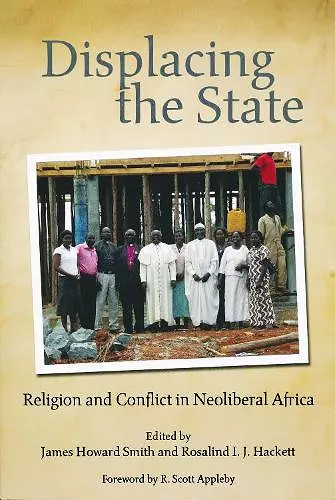Displacing the State
Religion and Conflict in Neoliberal Africa
Rosalind I J Hackett editor James Howard Smith editor
Format:Paperback
Publisher:University of Notre Dame Press
Published:30th Dec '11
Currently unavailable, and unfortunately no date known when it will be back

In colonial Africa, Christianity has often supported, sustained, and legitimated a violent process of governance. More recently, however, following decades of violence and oppression, churches and religious organizations have mobilized African publics against corrupt and abusive regimes and facilitated new forms of reconciliation and cooperation. It is the purpose of Displacing the State: Religion and Conflict in Neoliberal Africa to illustrate the nature of religion's ambivalent power in Africa while suggesting new directions in the study of religion, conflict, and peace studies, with a specific focus on sub-Saharan Africa.
As the editors make clear, most of the literature on conflict and peacebuilding in Africa has been concerned with dramatic conflicts such as genocide and war. In these studies, "conflict"usually means a violent clash between parties with opposing interests, while "peace" implies reconciliation and cooperation between these parties, usually with a view to achieving a social order predicated on the idea of the sovereign national state whose hegemony is viewed as normative. The contributors argue that this perspective is inadequate for understanding the nature, depth, and persistence of conflict in Africa. In contrast, the chapters in this volume adopt an ethnographic approach, often focusing on mundane manifestations of both conflict and peace, and in so doing draw attention to the ambiguities and ambivalences of conflict and peace in everyday life. The volume therefore focuses our attention on the extent to which everyday conflict contributes to subsequently larger and more highly visible clashes.
Displacing the State makes two important contributions to the study of religion, conflict, and peacebuilding. First, it shows how peace is conceptualized and negotiated in daily life, often in ways that are counterintuitive and anything but peaceful. Second, the volume uses African case studies to confront assumptions about the nature of the relationships among religion, conflict, and peace.
"This book adds to the growing literature about religion and conflict in Africa; it documents important traditional African responses to conflicts from a religion and conflict studies dimension; and it offers a different conceptualization of religion and conflict." —African Studies Quarterly
"In a Kony 2012 world, where activism often trumps analysis, there is a particular need for thickly grained studies that reflect the complex, multilayered nature of the encounter between African politics and religion. In this sense, Displacing the State delivers. Avoiding a spirit of either triumphalism or cynicism, the volume's eight case studies explore how religious actors instigate conflict, contribute to reconciliation, and 'foster conflict and peace simultaneously' . . . . Hackett's and Smith's text warrants a wide readership among students of political science, religion, and American studies." —Journal of Church and State
"Seldom have recent studies of African culture and politics directly treated 'religion and conflict' as such; Displacing the State remedies that omission. The authors collectively explore the ways religions and religious movements employ media, gender roles, social organizations, and translocal cultural values to challenge, reform, and otherwise shape political culture and social structures. Their insightful contributions are sure to push the ongoing scholarly debate on the complex relationships among ethnicity, religion, governance, and conflict in Africa." —R. Scott Appleby, University of Notre Dame
"Displacing the State: Religion and Conflict in Neoliberal Africa is an excellent collection of essays grounded in extensive ethnographic work and a critical, historical, and contemporary analysis that brings theory to bear on sociopolitical and religious realities in Africa. The editors, James Howard Smith and Rosalind Hackett, are to be commended for putting together an engaging and riveting text with essays that are grounded historically but, more importantly, focus on contemporary religious communities such as Mungiki in Kenya and the Masowe prophets in Zimbabwe. The compelling analysis of contemporary issues explores attempts at peace building, making this book essential reading for scholars of religion and a requirement for courses on religion and the state." —Elias Kifon Bongmba, Rice University
ISBN: 9780268030957
Dimensions: 229mm x 152mm x 17mm
Weight: 422g
312 pages